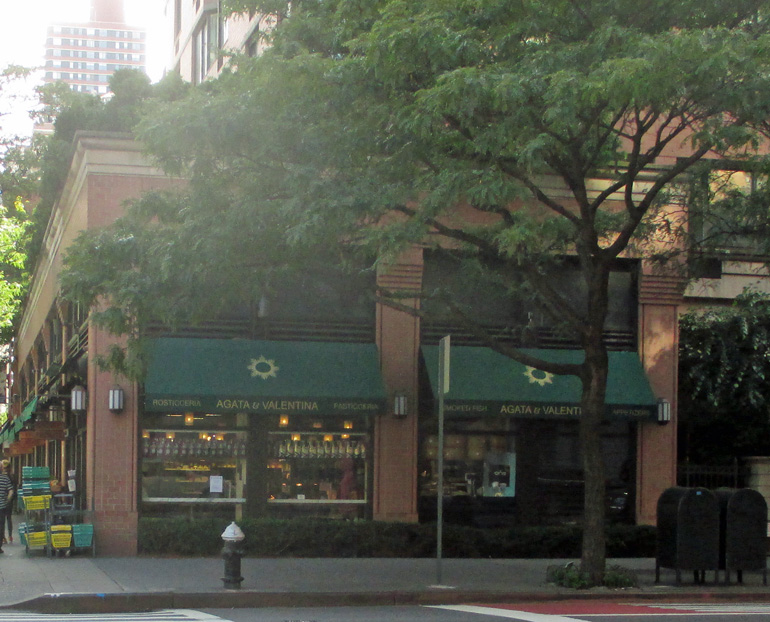Gotham Diary:
I Forgot Ward’s Island
September 2017 (IV)
Tuesday, September 26th, 2017
26 27 and 28 September
Tuesday 26th
Now that David Brooks has said it, I hope that he’ll stick with it, and hammer at it until a few other columnists pick it up and see that he’s right.
Donald Trump came into a segmenting culture and he is further tearing apart every fissure. He has a nose for every wound in the body politic and day after day he sticks a red-hot poker in one wound or another and rips it open.
Although I’d quibble with a lot of Brooks’s finer points, I believe that I have been trying, for several years, to say what he has expressed in one column. The meritocratic dispensation that has governed the United States for fifty years, guiding people and institutions away from provincial moralism and toward open-minded acceptance of different backgrounds, has discredited itself, because it has also encouraged a startling self-centered economy that rewards unusual talent and punishes the merely ordinary. We don’t need Donald Trump to tell us any of this.
Or maybe we do, since so many Americans are responding to Trump’s eye-poking with indignation and outrage, as if these were still sufficient to stop him. But they have the opposite effect.
He is so destructive because his enemies help him. He ramps up the aggression. His enemies ramp it up more, to preserve their own dignity. But the ensuing cultural violence only serves Trump’s long-term destructive purpose.
How long will it take intelligent Americans to stop reacting to Trump and to get on with the serious business of designing and implementing a new dispensation? One in which, for starters, nobody mistakes Hillary Clinton for an inspiring political leader, or allows an unseasoned Barack Obama into the White House?
The football imbroglio is far more menacing than most Americans want to imagine, however they feel about “taking a knee,” and I tremble to think how ruinously its undigested contradictions could erupt on an unthinking population. Football is no longer a game that involves big guys and a torpedo-shaped ball, but a cultural phenomenon that engulfs masses of people in a stew of money, racism, and entertainment — and the “money” and “entertainment” parts are just as ugly and rooted in bad faith as the “racism.” Why, one thinks to ask, do games begin with patriotic displays the likes of which are not encountered in other social contexts? The game of football has now been hijacked by the venerable but gratuitous ritual that precedes it. It has always seemed to me that the function of the national-anthem business, whatever its purpose, has been to get fans in the mood for a fight. What else is the point of a cheer, in the absence of real danger?
If I were a poet or a symbolist, I would declare that the phenomenon of American football, at both the collegiate and professional levels, marks the meritocratic dispensation for destruction. As a realist, I simply worry that the mass of fans will sink into an unguided frenzy, a replay of The Bacchantes. While it rages, the president will claim to be surprised and bewildered by the charge that his words set it off. And his disingenuousness will not be altogether baseless. Donald Trump is the little boy who pointed out the emperor’s nakedness. Ever since the beginning of his campaign in 2015, he has been telling us things that are true, even if they are mixed up with lies. Right now, he is telling us that many football fans believe that the players ought to keep their political concerns to themselves. Who can doubt it? And yet who can doubt that many players believe that there is nothing political about the inhuman mistreatment of their brothers and sisters? Football has encompassed a host of inconsistent objectives because it is flush with money and thrills. The last thing it needs is scrupulous examination. I cannot imagine, in fact, that it will survive the generation that is coming of age with images of Aaron Hernandez’s damaged brain. But if football is not quite too big to fail, it is too big to fall apart. The NFL owners are nervously aware that it might.
***
In the current issue of Harper’s, thirteen writers have filed reports on the state of their part of the nation. I’ve read only one, myself: Marilynne Robinson’s, from Iowa. Robinson appears to have an acute understanding of the economic and political issues that divide Iowans, and I think that she would make a very effective adviser for candidates opposing the ideologically-besotted Republicans who have gerrymandered their way into power there. I would have only one word of advice for her: keep it local. I think that her views would be far more digestible and popular if they were not associated with a national organization of liberal bent. If Robinson and her friends established an Iowa Statehouse Party, and concentrated on matters of local governance, while avoiding issues that have little or no direct bearing on local affairs, they might be able to turn out the behemoths. In short, they would campaign for Iowans, not for issues.
***
Wednesday 27th
My theme for today is a conundrum: liberal leadership.
Last week, I postulated that liberalism began as the solution to a prolonged conflict between the kings of England and the leading English noblemen. An institution was required to regulate the royal council, to make it less vulnerable to royal whim. The institution was found in parliament, which, in typical English fashion, had already existed for centuries. There was no need to invent anything. Now parliament was repurposed. It developed an entirely new function: providing a leader. In the new arrangement, the king could consult with anyone in the world, so long as that person was the leader of Parliament (or not inimical to the leader) — who presently came to be called “prime minister.”
At the time of this arrangement, Parliament was still very much the tool of the great men of England. Commercial and urban voices were commanding more respect, but they were easily co-opted, often by marriage. Ordinary Britons were not involved in Parliamentary politics for a good long while. Not until 1867, nearly two hundred years after the liberal solution was inaugurated, did the electoral franchise spread to the broad mass of Englishmen. By 1867, the conflict that inspired liberalism was a ghost, and “liberalism” had moved on to other things, notably to ideas about global free trade. These ideas divided the two large parliamentary parties, but although one was called “liberal” and the other “conservative,” both organizations were liberal in nature. The conservatives, it is true, had sharper notions of ecclesiastical authority, but other kinds of authority were odious to both parties, at least as brought to bear on men of property. Despite a lot of things — imperialism, workhouses, the Irish potato famine — the United Kingdom had a worldwide reputation for being the homeland of liberty, largely because, if you were a gentleman with an income of £200 per annum, nobody could tell you what to do.
Liberals did not command; they persuaded. They believed that coerced support is unreliable — which it is, if the people doing the coercion don’t have their hearts in it. Liberals approached the body politic as if it were a club, dependent on the voluntary cooperation of all its members. Everybody was encouraged to believe that the healthy existence of the body politic was the first concern of the leading men, that high officials would never allow selfish motives to risk harming the political organism. This did not guarantee, however, that politicians would know what to do in the event of accidental emergency. The worst kind of emergency was found to be not war but the upheavals regularly engendered by the vagaries of economic liberalism, which came to be better known as “capitalism.” That is, political liberals turned out not to be the people to turn to for help when economic liberals (“businessmen” and “industrialists”) lost control of their affairs. Whether politicians or executives, liberals were averse to giving orders, to exercising authority. Financial downturns became serious threats to the body politic when the liberal economy employed almost all workers in large, interrelated blocs, adversely affecting all business sectors at once. By comparison, the command economy (socialism) seemed a lot more humane.
In the wake of the disaster that the popular mind dates to 1929, liberals developed a network of safety features that constrained the spread of collateral damage. They were designed, however, to prevent market fluctuations from putting people out of work. They were powerless to prevent the disappearance of jobs for other reasons, of which two very serious ones developed in the Postwar era. Both were inevitable in a liberal climate. Workers in the developed West were replaced by cheaper workers elsewhere and by machines. A third development was more difficult to foresee. Liberals have always been noted for their respect for the kind of education that imparts liberal values along with useful skills. These liberal values, which probably don’t bear close scrutiny, provide a kind of ballast of tradition, however bogus, that steadies the liberal course through the uncertainties of innovation. It is not at all ironic that the government of the most prosperous kingdom in history erected its official, central palace — Westminster — in an antiquated style that was yet not at all Antique but original to Europe itself: the Gothic (initially a term of scorn). This complicated attitude toward the past was swept away, however, by the meritocracy of the Twentieth Century.
It is only lately that I have seen how tightly the growth of liberal democracy and the liberal economy has been intertwined with the idea of automation, of things happening independently of human agency. The industrial technology, which is not just a matter of machines but also of social organization, is impressive enough. Our constitutional devices, with their checks and balances taking the place of human arbiters — “a machine that would go of itself,” ours was called — reflect great psychological ingenuity. But the capstone of liberal thinking has got to be the systematic gestation of an élite class by competitive examination. Such examinations slowly but surely drove out the “liberal values,” and the new élite soon demonstrated an astonishingly single-minded expertise at taking care of itself. The question is whether liberal solutions to this latest setback will be forthcoming.
***
Thursday 28th
Questions: Who is James Ward, and who paid (how much) for that Op-Ed page ad?
It took up more than a quarter of the space in yesterday’s paper. (I can’t find it online.) Boxed in black like a memorial notice, and printed in a font so distant from Times style that there was no real need to post the “Advertisement” disclaimer, the unbroken slab of type, with the name “James Ward” at the bottom, followed by an email address for “jamesoliver037,” promised not to be a crank letter.
Opposition to “Diller’s Island,” [sic] has often been portrayed as the work of a small group of obstructionist eccentrics, scheming behind the scenes…
Then it went on in the usual manner of crank letters. Which isn’t to say that I disagree with James Ward about “Diller’s Island”! What caught my eye was the reference, smack in the middle of the text, that I feel that I’ve been seeing not infrequently of late.
The proposed plans for Diller’s Island would also, apparently, have involved, at least intermittently, loud amplified music, given the developer’s stated intention to provide New Yorkers with a truly “dazzling” experience (in this age of hyperconnectivity, it is really necessary for every experience to be dazzling? [sic]; see Neil Postman’s 1985 book “Amusing Ourselves to Death: Public Discourse in the Age of Show Business.”)
I had been asking the same question myself, ever since an editorial lamenting the collapse of the project, about two weeks ago, ended as follows:
Maybe Mr. Diller’s decision to pull the plug is reversible. Or maybe another person with deep pockets will put up money for this project or something similar. Private money is not necessarily to be shunned. It’s not as if the city is awash in government funds for new parks or other captivating public spaces.
Unlike Mr Ward, who devotes slightly less than half of his notice to grumbling ruminations on improper collusion between elected officials and private developers, I am not deeply invested in shunning private money. But whether or not the city can afford to create “new parks or other captivating public spaces,” there’s no question that it already has plenty of them. Not that I’m any more comfortable with “captivating” than I am with “dazzling.” Those are words that, at least so far as public spaces go, I associate with theme parks and other bogus attractions. For an honest cheap thrill, crossing the Main Course of Grand Central Terminal at rush hour can’t be beat.
As I recall, the plans for Diller’s Island showed an undulating pancake that appeared to float several storeys above the surface of the Hudson. It was dotted with various landscapes — parklike groves, an amphitheatre? and other play spaces. There was nothing urban about it, and nothing real, either. It brought to mind the projections of the future that were a feature of the 1939 World’s Fair. It looked like something that New Yorkers would expect to find far out of town, somewhere near the Pacific Ocean perhaps. It also looked like something that would draw lots of tourists, as an island of relief from the New York experience. It looked ridiculous. Probably harmless — here again I disagree with Mr Ward — but ridiculous.
What I couldn’t make up my mind about is the Neil Postman name-check. It’s a little off-base. Postman was talking about television, television news in particular, and about the dumbing-down that, in his view (with which I wholeheartedly agree), the television medium itself necessarily imposes on civil discourse. He was not talking about the problem of having fun when you go out to have fun. And yet. Isn’t that precisely the problem with Diller’s Island? There’s an unwonted shift in the meaning of “fun.” Wires seem to me to be crossed if going to a park leads to the experience of being entertained. There is a slippage, a displacement of the self — a dazzlement, perhaps. I go to the park to walk among lawns and trees, with maybe a few flowers. There are other people in the park, but I don’t go there to meet them. We enjoy the park together in silence — not that there’s anything wrong with striking up the odd conversation. Lots of people in Carl Schurz Park sit on benches staring at open books. They’re captivated, if at all, by what they’re reading, not by the public space.
I thought of the High Line. My friend Eric arranged for me to walk the High Line several years ago, and a few weeks ago I returned the favor by introducing him to Carl Schurz Park. It was a sunny, late summer weekend afternoon, and there were lots of people in the park. It wasn’t as crowded as the High Line had been, but then it is only a local park, much used by its neighbors but unknown to most New Yorkers (much less tourists). The High Line is quite something else — I don’t think I need dilate — but what strikes me is that, among its many charming features, Carl Schurz Park boasts a finer example of the only thing that the High Line has going for it, which is a promenade. Now, a promenade is a very good thing, a vital element in urban life that has gotten short shrift in auto-mad America. It is to be hoped that promenades like the High Line will eventually alert the people walking on it that they are not in fact encased in the cabs of SUVs, and that what they are wearing is an aspect of everybody else’s landscape. As promenades go, however, the High Line is either cramped or vacant. I don’t think that it’s ever actually vacant, but when it’s not cramped, and you can take in the fixtures and the plantings, it looks abandoned, which I believe is part of its design.
The promenade at Carl Schurz Park, in contrast, is the grandest passage on the John Finley Walk, an intermittent pathway along the borders of Manhattan Island. A lengthy terrace stretched across the top of a structure through which pass, one atop the other, the downtown and uptown lanes of the East River Drive, the promenade is possibly higher above the East River than Diller’s Island would have been above the Hudson. There is nothing to look at except the river and the sky. There are some buildings, but aside from the towers of Long Island City, off to the southeast, they are not very tall, and the manmade part of the view is dominated by the Queensborough Bridge, or half of it, twenty-five blocks away. If you turn around, you have the Triborough Bridge, Hellgate Bridge, Manhattan State Hospital, and even more river and sky. Everything seems to make the river wider and the sky higher. It is the most spacious Manhattan spot that I know, always exhilarating to step out onto from the arbors of the park.
Every now and then, a tourist boat swans along. If you wave, they wave back. It’s as close as most of them are going to get to where you are, but they probably think you’re a tourist, too.
In the end, James Ward couldn’t resist pulling the kitchen sink right out of the wall, and the stove with it, and hurling them both at Diller’s Island with the T word.
And, speaking more generally, for a city which prides itself on its liberal political heritage, this lock-step lining up of local and state politicians, their developer friends, and Hollywood royalty, together with the concomitant dismissal of legitimate local concerns, reeks more of a totalitarian approach to governing than the bottom-up and democratic process one should ideally look for in a city of our size and stature.
“Bottom up”? As I say, paid for by whom?
Bon week-end à tous!




